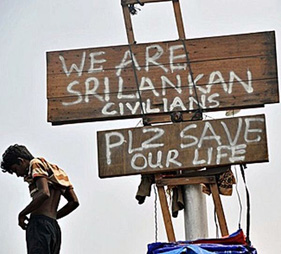Sri Lanka windows open to justice

Sri Lanka Campaign for Peace and Justice blog starts in preparation for the vote at the UN Human Rights Council, Amnesty report and TV programme
In the run up to what could be a crucial vote in the Human Rights Council, a blog will be lifting the lid on the real situation in Sri Lanka by publishing a series of eight stories about the way the war in Sri Lanka ended.
The Sri Lanka Campaign for Peace and Justice blog: http://blog.srilankacampaign.org/ will be running one story a day between Monday the 12th and Monday the 19th of March. The stories will be written by Sri Lankan witnesses and the Sri Lankans who have recorded their story, but because of the very real fear of retaliation these authors will write under the pseudonym "The Social Architects".
The Social Architects (TSA) are comprised of a diverse group of writers, intellectuals and working professionals. While most of TSA’s members hail from the country’s North and East, the group also includes other scholars and activists who have been working on issues related to Sri Lanka. TSA seeks to educate, to inform and to provide timely, thoughtful analysis on a range of topics.
Fred Carver, Campaign Director for the the Sri Lanka Campaign for Peace and Justice said, "the Government of Sri Lanka would have you believe that there are not more stories from Sri Lanka because all is well – in fact it is because they have intimidated their critics into silence. But through initiatives like these, their stories will be told nevertheless."
An excerpt, "Rasadurai’s story":
Rasadurai was caring for a group of children from an orphanage in the No fire Zone during the end of the war.
During the night of May 17th, I said about fifty rosaries in our bunker. The bunkers were shallow becausewe were close to the sea so water would come through the sand. The Army soldiers were throwing grenades into the bunkers and killing the people all night. That night the children were saying, "Father, we are going to die here." I was saying rosaries and preparing to throw myself on top of the grenade to save the others in the bunker.
Rasadurai goes on to document the war crimes he saw and the suffering he witnessed, and names the senior military commanders responsible.
Human rights violations remain routine in Sri Lanka almost three years after the end of the war, an Amnesty International report said this week.
The group says that hundreds of people are detained without trial, often held incommunicado and frequently tortured.
The Amnesty report alleges that arbitrary detentions and enforced disappearances remain routine, despite the conflict ending in May 2009 and despite the lifting of the state of emergency last year. It says that serious human rights violations are neither investigated nor punished.
A television documentary due to be aired in Britain today alleges that at the end of the war, the 12-year-old son of rebel leader Prabhakaran was executed at close range.
"We have obtained a sworn affidavit from a senior Sri Lankan officer in which he suggests that the boy was apparently interrogated about his father’s whereabouts, and then killed," a Channel 4 spokeswoman told the BBC.
"Evidence that the shooting of the 12-year-old was an execution rather than a combat injury can be seen in high resolution photographs of his dead body – these stills are examined by respected forensic pathologist Derrick Pounder in the film." "This is a murder – there’s no doubt about it," he says.
Mr Pounder said that the teenager, Balachandran Prabhakaran, had five dead males alongside him "who may well have been killed before he was killed".
"We have no evidence that he was blindfold and he’s been shot by someone standing in front of him with the end of the gun within a few feet of his body," he said.
The Sri Lankan High Commission in London has condemned the programme as based on "a number of highly spurious and uncorroborated allegations".
Sri Lanka meanwhile is preparing its own documentary on the final battle with the Tigers, army chief Lt-Gen Jagath Jayasuriya has said.
He told troops on Monday that the documentary includes testimony from frontline troops and would "clarify events leading to the death" of Prabhakaran who is alleged to have been shot in cold blood while trying to surrender.
The army defeated Tamil Tiger rebels to end more than 25 years of bloody civil war. Both sides have been accused of rights abuses.
The Sri Lankan authorities have repeatedly denied claims that troops killed Tamil Tiger leaders as they tried to surrender. The army says the rebel leaders died in battle.
Valere Tjolle
Valere is editor of the Sustainable Tourism Report Suite 2012 Special Offers HERE
 United Kingdom
United Kingdom United States
United States Asia Pacific
Asia Pacific












































Dozens fall ill in P&O Cruises ship outbreak
Turkish Airlines flight in emergency landing after pilot dies
Boy falls to death on cruise ship
Unexpected wave rocks cruise ship
Woman dies after going overboard in English Channel